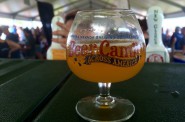All About the Stout
The origins of your favorite dark beer, from Ireland to Milwaukee
Beer is one of the world’s most widely consumed beverages, and comes in hundreds of styles with origins throughout the world. While some have traceable origins like the Czech Pilsner, others such as the Stout, which many attribute to Ireland, are subject to heated debate.
The stout style has a proud history made confusing by well-spread and accepted myths surrounding the style. For example, when an American thinks of stout they often think of a jet black beer with a roasted coffee aroma, dry flavor, and creamy tan head. While this describes the Irish Stout, made famous by Dublin’s own Guinness, Irish Stout is just one of nine official varieties of the style, which originated in Britain in the early 18th century.
Though subject to serious debate, British sources state that at the time of origin the style was referred to as Porter, not stout. In fact, the origin of the word stout comes from brewers referring to their most potent porters, generally 7 to 8 percent alcohol by volume, as “Extra Porter,” “Double Porter,” or “Stout Porter.” Over time, the name Stout took over, though term porter continues to be used today as a synonym to stout or to refer to weaker forms of stout.
Today seven stout varieties exist in addition to the dry style and porter. The difference between these varieties is mostly based on additional ingredients added during the brewing process. But in the case of the Baltic Porter, the difference is its place of origin.
The stout style did originate in the British Isles, but two can lead to some confusion — the Russian Imperial Stout and the Baltic Porter. Despite its name, the Russian Imperial Stout is not actually Russian, but British in origin. The name comes from the fact that the beer was specifically brewed for Catherine II of Russia in the 18th century. What sets it apart from traditional stout is its strong flavor and high alcohol content made possible by using twice or even thrice the amount of hops and malts to ensure the beer survived the long trip to Russia by sea. The popularity of the style caught on quickly in the Baltic region, particularly Poland, leading to the creation of the Baltic Porter, which is made unique by using ingredients native to the Baltic.
Other stout styles included coffee, oyster, oatmeal, milk, and chocolate. Though, like the Russian Imperial style, the names can be deceiving. Coffee, milk, and chocolate stouts oftentimes do not contain chocolate, milk, or coffee. Instead, the name comes from the distinctive flavor brought on by the malts used in the brew, or in the case of milk stout, lactose sugar that is added to sweeten the beer. However, in the case of oyster and oatmeal, their namesake ingredients are often included, though the former has fallen into decline and at times refers to the food that best pairs with the beer.
One of the world’s longest lasting beers, stout is now a household style and has made it across the Atlantic to America. Here in Milwaukee, an explosion in craft brewing has made stout a local staple and at least one variety can be found in the ranks of just about every one of Milwaukee microbreweries. Popular stouts from Milwaukee available year round include Milwaukee Brewing Company’s milk stout, Polish Moon, Sprecher’s Irish Stout, and Lakefront’s Fuel Cafe, a coffee stout named after the Riverwest cafe. Though not available year round, Horny Goat Brewing Co. offers three chocolaty stouts including Chocolate Cherry, Brownie Porter, and Stacked Milk Stout. From elsewhere in Wisconsin, New Glarus, famous for its Spotted Cow cream ale, offers an impressive lineup of seven stouts and porters of varying flavors such as coffee, cherry, and Russian Imperial. North Woods legends Leinenkugel’s also offers three stouts and porters throughout the year, including Russian Imperial, Vanilla Porter, and the rare but decadent Licorice Porter made in collaboration with Lakefront Brewery. Though varying in style, each stout offered by Wisconsin’s various breweries are sure to please.
Beer City
-
The Crowd Rules At MobCraft Brewery
 Jul 7th, 2016 by Joey Grihalva
Jul 7th, 2016 by Joey Grihalva
-
Sierra Nevada Beer Camp Was a Winner
 Jun 13th, 2016 by Joey Grihalva
Jun 13th, 2016 by Joey Grihalva
-
The Rise of O’so Brewing Co.
 Dec 1st, 2015 by Christophor Rick
Dec 1st, 2015 by Christophor Rick

















